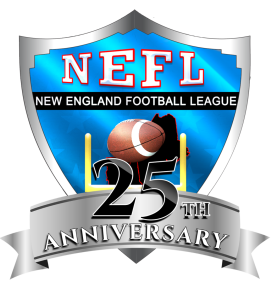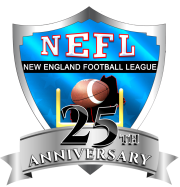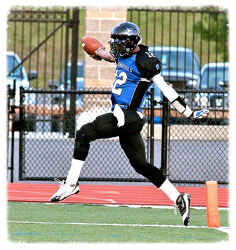
New England Football League
NEFL Mission Statement
The purpose of this organization is to provide men, eighteen years of age and older, the opportunity to play full contact amateur football in a controlled, organized and structured environment at various levels of skill while being neither exclusionary nor discriminatory towards any person or persons wishing to participate.
History of the New England Football League
The N.E.F.L. was founded on the basic principles of promoting semi-pro football in a controlled and structured environment while still maintaining a grass roots approach by making participation as cost effective as possible, controlling travel through scheduling geographically by a teams location, and creating a competitive balance through various levels of competition. This concept has proven to be the right one for the N.E.F.L. Over the past twenty years, this approach has been the main reason for the leagues growth and success, along with all of the many outstanding and dedicated players, coaches and administrators that tirelessly commit themselves every year to their organizations because of their love for the game.
It is the number one goal of the N.E.F.L. Board of Directors to continue to provide a forum that will promote a positive and rewarding experience for everyone. There are currently more than 40 teams competing in the NEFL.
1994
The N.E.F.L. was founded in 1994 by League President and Director of Marketing, Tom Torrisi, Chairman Matt Brien, Commissioner Bob Oreal, Vice-President and Treasurer John Motta and Secretary Christine Torrisi. In its inaugural season, the league consisted of only four teams, the Lawrence Lightning, the Greater Lawrence Grizzlies, the Rockingham Reapers and the Haverhill Rage. All the games were played on one practice field and each team had only between 22 – 25 players on their roster. The first year, however, was a success because the league was built on a solid foundation. Each team had sponsorship from local area businesses and the league had adopted a stringent set of rules, regulations and bylaws that kept everything on and off the field highly organized. All game officials were certified Eastern Mass. high school officials and all rules were strictly enforced right down to the uniform rule. It was these things that gave the N.E.F.L. credibility and allowed for media coverage by local newspapers. The Lawrence Lightning became the leagues first champions by defeating the Haverhill Rage.
1995
In 1995, the N.E.F.L. expanded by two teams, the Baystate Bulldogs, another team representing the Greater Lawrence area and the Boston Bandits from Greater Boston. The league now had its first team from outside of the Merrimack Valley. The Lawrence Lightning moved to Methuen to become the Essex County Sharks, the Rockingham Reapers changed their name to the Cougars, and the Haverhill Rage relocated to Hampton, NH to become the Seacoast Rage. The league also joined the AFA and each teams roster grew to between 30 – 35 players. The league also signed its first radio contract and had the N.E.F.L. game of the week broadcast each Monday night on WCCM radio in Lawrence, MA. The second year had been even more successful than anyone had hoped and the Seacoast Rage defeated the Rockingham Cougars to become champions of the N.E.F.L. for 1995.
1996
The 1996 campaign saw the N.E.F.L. undertake its largest expansion to date. The Merrimack Valley Vipers, the Middlesex County Seminoles, the Eastern Mass. Mavericks, the Massachusetts Havoc and the Southern Maine Spartans became the five newest members of the league. The Greater Lawrence Grizzlies folded after the 1995 season. The N.E.F.L. now had ten teams with a Northern and Southern division. Four of the five new teams were successful and made the playoffs. It was the Massachusetts Havoc, however, that took home the N.E.F.L. championship by upsetting the previously undefeated Eastern Mass. Mavericks and end a third successful year for the league.
1997
1997 had yet three more new teams enter the N.E.F.L. The Rhode Island Rhinos, the South Shore Stars and the Greater Haverhill Highlanders were added which made for a strong and competitive twelve team league. The Southern Maine Spartans left the N.E.F.L. in 1997 to join the new Maine State Football League. The N.E.F.L. expanded the rosters to 40 players to accommodate the growing interest. For the first time, the league would have a two time winner. The Seacoast Rage, winners of the N.E.F.L. Northern Division, playing in their third championship game, would be going against the defending champion, Massachusetts Havoc, winners of the N.E.F.L. Southern Division. The Massachusetts Havoc became the first team in league history to not only win two championships but win them back to back. The Havoc then went on to become the first ever winners of the North Atlantic Football Federation in the inaugural Harvest Bowl when they defeated the Central Maine Storm of the Maine State Football League.
1998
The 1998 season opened with the Greater Lowell Nor’easter replacing the defunct Seacoast Rage and the Rhode Island Gridiron taking the place of the Merrimack Valley Vipers, who took a one year leave of absence to reorganize.
1998 was another exciting and successful season for the N.E.F.L. The Greater Lowell Nor’easter, Northern Division Champions, defeated the Southern Division Champion Tri-boro Rhinos to win the N.E.F.L. championship. The Nor’easter then went on to defeat the Central Maine Storm of the Maine State Football League in the first round of the N.A.F.F. playoffs. The Irondquoit Sting, champions of the New York Football League (NYFL) traveled to Massachusetts to play the Nor’easter for the second annual N.A.F.F. double AA national championship Harvest Bowl. Greater Lowell defeated Irondquoit and became the N.E.F.L.’s second national champion in two years.
1999
The 1999 season saw the return of the former Merrimack Valley Vipers to the league as the Lawrence Lightning, and the Essex County Sharks merged with the Greater Haverhill Highlanders. Although the Rhode Island Gridiron and Middlesex County Seminoles folded due to financial problems, the Quincy Granite became the newest members of the N.E.F.L. and were tremendously successful, finishing second behind the Massachusetts Havoc in the southern division. Each teams roster limit was increased to fifty players in 1999 due to greater participation. The Greater Lowell Nor’easter won their second straight N.E.F.L. title by defeating the Massachusetts Havoc in a championship game that featured two of the top AA teams in New England. The Nor’easter then defeated the Buffalo Gladiators, title winners of the New York Amateur Football League (NYAFL), for their second straight AA national title in the annual Harvest Bowl. Minor League Football News also named the New England Football League “AA League of the Year” in 1999 and awarded it with the privilege of hosting the annual “Free Agent Scouting Combine All-Star Game” in 2000. This game featured the best National Minor League All-Stars in the United States playing the New England Football League All-Stars on , May 20 at Cawley Stadium in Lowell, MA. The game was an overwhelming success with the N.E.F.L. All-Stars defeating the National Minor League All-Stars.
2000
The dawn of the new millennium brought new challenges and opportunities to the N.E.F.L. The North Atlantic Football Federation changed its name to the North American Football Association (N.A.F.A.) and became a member of the National Football Alliance (N.F.A.), which sponsors a national tournament that brings the best teams from the United States and Canada together to determine a national champion. Expansion into Maine and New Hampshire saw the N.E.F.L.’s roster of teams grow to fourteen and a second conference, the North Atlantic Conference, was added. The Seacoast Hawks from Portsmouth, NH, the Southern Maine Raging Bulls, the York County Warchiefs, the Beachside Tomcats from Old Orchard Beach, ME, the Granite State Rebels from Manchester, NH and the Nashua Predators comprised two very strong divisions, the inland and coastal, with the Seacoast Hawks winning the North Atlantic Conference championship. 2000 also brought the merger of the Lawrence Lightning with the Greater Haverhill Highlanders and the Rockingham Cougars with the Eastern Mass. Mavericks. The Bellingham Minutemen, headed by former New England Patriots, Steve Grogan, Ronnie Lippett and Mosi Tatupu, also joined the N.E.F.L. The Baystate Bulldogs changed their name to the Commonwealth Cavalry and the Mass. Havoc and Quincy Granite dropped out of the league. The Greater Lowell Nor’easter became the first team in the history of the N.E.F.L. to win three consecutive championships by again defeating the Tri-Boro Rhinos in a rematch of the N.E.F.L.’s 1998 championship game. Unfortunately, the Nor’easter were unable to defend their N.A.F.A. title when this time, they were defeated by the Buffalo Gladiators, champions of the N.Y.A.F.L., in a rematch of last years Harvest Bowl.
2001
In 2001, the N.E.F.L. expanded into Vermont with the Ice Storm and added another team from the state of Maine, the Western Maine Rolling Thunder. The Eastern Mass. Mavericks folded due to financial reasons, the Commonwealth Cavalry, under new management, changed its name to the Leominster Razorbacks and the Tri-Boro Rhinos took a one year leave of absence to reorganize to bring the total number of teams in the N.E.F.L. to fifteen. The Boston Bandits, the leagues oldest member, defeated defending three time league champion, the Greater Lowell Nor’easter, for their first New England Football League title. The Nor’easter would exact their revenge in the first round of the N.A.F.A. playoffs as they rebounded and defeated the Bandits for a return trip to the N.A.F.A. Championship Game. The Nor’easter went on to face the Buffalo Gladiators for the third time in three years, this time traveling to Buffalo for the Harvest Bowl. For the second time in two years, the Nor’easter came up just short as they were once again defeated by the Gladiators. The Southern Maine Raging Bulls became champions of the North Atlantic Conference when they defeated the expansion Vermont Ice Storm, a team that had a very successful first year.
2002
2002 witnessed the N.E.F.L. become the first league in the country to accommodate teams at three different skill levels in three conferences, in addition to adding three new teams: the Monadnock Marauders, the Western Mass. Wolverines and the Connecticut Thunder. The Tri-Boro Rhinos made their return to the league and the Western Maine Rolling Thunder, under new management, was now the Notre Dame Cobras, bringing the total number of teams in the N.E.F.L. to nineteen, encompassing all six New England states. Our Maritime Conference (A) had the first year Connecticut Thunder win the championship, defeating the York County (ME) Warchiefs in the new conference’s first ever title game. The North Atlantic Conference (AA) saw the Vermont Ice Storm playing in its second championship game in as many years, defeat the New England Stars for their first championship. The N.E.F.L.’s marquee Colonial Conference (AAA) featured the Boston Bandits and the Greater Lowell Nor’easter play in a rematch of the 2001 finals. This time, the Nor’easter defeated the Bandits in the N.E.F.L.’s first ever overtime championship game and claim their fourth N.E.F.L. title. Greater Lowell then went on to capture its third N.A.F.A. national championship title when they defeated the Brooklyn Mariners in Harvest Bowl IV.
2003
In 2003, the New England Football League undertook its largest expansion since the 1996 season. Four new teams joined the N.E.F.L. The South Shore Outlaws became the newest entry into the (AA) North Atlantic Conference and the Central Maine Shockers, Penobscot Seadragons and Maine Blizzard were placed in the (A) Maritime Conference. The Greater Haverhill Highlanders, under new team management, changed their name to the Merrimack Valley Crush. The Seacoast Hawks defeated the Maine Tomcats to become N.E.F.L. (A) Maritime Conference champions, and the New England Stars defeated the Connecticut Thunder to become champions of the N.E.F.L. (AA) North Atlantic Conference. The (AAA) Colonial Conference saw two long time rivals battle it out in the championship game for a third time when the Boston Bandits played the Greater Lowell Nor’easter. The Bandits beat the Nor’easter for their second league title in three years. The Bandits and the Nor’easter, along with the Crush, were all unfortunately defeated in the first round of the N.A.F.A. play-offs with the Bandits losing to the eventual National Champion, Brooklyn Mariners, and the Nor’easter losing to the runner-up, Irondquoit Sting. The Maine Blizzard left the league at the end of the 2003 season.
2004
The 2004 season saw four more new teams enter the league, the Worcester County Wildcats, and the Massachusetts State Warriors based out of Holyoke, MA became the two lastest (AA) entries into the North Atlantic Conference, and the Mid Coast Chaos from Maine and the Southern Rhode Island Raptors were the two newest entries into our (A) Maritime Conference. The New England Stars decided to leave the NEFL and still maintain a great flag football team in the BEFL(BOSTON ELITE FOOTBALL LEAGUE). They were replaced with a new franchise called the New England Bolts. Once again the Greater Lowell Nor’easter took home the championship trophy in the Colonial Conference making it number five, defeating the Leominster Razorbacks. In the North Atlantic Conference, the Connecticut Thunder beat the Vermont Ice Storm for their first (AA) title. The Maritime Conference, in a game for the ages, saw the Hampton Hurricanes defeat the Central Maine Shockers in overtime for Hampton’s first championship. The Greater Lowell Nor’easter and the Connecticut Thunder both advanced to the semi-final and quarter final rounds of the N.A.F.A. tournament respectively, but unfortunately, both teams came up just short in those regional play-off games. This was a tremendous accomplishment for both teams, considering the fierce competition in the Harvest Bowl tournament, particularly for Connecticut, a (AA) team playing in a (AAA) tournament.
2005
The 2005 season was a record setting one for the N.E.F.L. in terms of expansion. For the first time in our history, we had five new teams enter
the league. The Ocean State Vipers from Rhode Island were added to our Colonial Conference, the Whaling City Clippers out of New Bedford, MA became the latest entry into our North Atlantic
Conference, and the
Hillsboro County Devils from Manchester, NH, the Southern New England Rage of Mansfield, MA, and the Connecticut Storm, a (A) affiliate of the (AAA) Connecticut
Thunder, all joined our Maritime Conference. The Tri-Boro Rhinos were granted a one year leave of absence before the start of the season. The Vermont Ice Storm and the Baystate Rolling Thunder left
the league at the conclusion of the 2005 season. The three champions that were crowned were the Boston Bandits who won their third N.E.F.L. title defeating the 2004 defending champion Greater Lowell
Nor’easter in the Colonial Conference, the Seacoast Hawks defeated the South Shore Outlaws to claim their first North Atlantic Conference title to go along with their two Maritime Conference
championships, and the Southern Rhode Island Raptors beat the Penobscot Seadragons to win their first Maritime Conference championship. The N.E.F.L. sent five of its teams to the 2005 N.A.F.A.
tournament. The Greater Lowell Nor’easter, the Merrimack Valley Crush, the Seacoast Hawks, and the South Shore Outlaws all played well, but were eliminated in first round games. The Boston Bandits
made it to the N.A.F.A. semi-final game where they were narrowly defeated by the Buffalo Gladiators.
2006
In 2006, the N.E.F.L. added six new teams. The Medford Mighty Mustangs and the North Shore Generals joined our Colonial Conference, the Eastern Maine Fighting Warriors and the Mill City Maulers joined our North Atlantic Conference, and the Granite State Demons and Southern New Hampshire Beavers joined our Maritime Conference. The Notre Dame Cobras went undefeated during the regular season and went on to claim their first ever Maritime Conference Championship with a win over the Southern New England Rage. The North Attleboro Renegades defeated the expansion Mill City Maulers in the North Atlantic Conference Championship game to give the Renegades their first ever championship. In the Colonial Conference, the Boston Bandits won their fourth league title by once again beating the Greater Lowell Nor’easter who was their opponent in five N.E.F.L. title games. The Boston Bandits did not go on to play in the 2006 Harvest Bowl tournament because of a schedule conflict and the Greater Lowell Nor’easter lost in the first round to the eventual champion Brooklyn Mariners.
2007
The 2007 season saw eight new teams enter the N.E.F.L., the largest expansion the league has ever undertaken. The Middleboro Cobras, one of the oldest and most successful semi-professional, minor league football teams in the country, with numerous championships, joined our “AAA” Colonial Conference, along with the Quincy/Weymouth Sharks. The Middlesex Mayhem and Northeastern Knights were placed in our “AA” North Atlantic Conference, and the Southern Vermont Storm, the Middletown Connecticut Spartans, the Kennebec Valley Tigers and the Tri-City Charge became the newest members of our “A” Maritime Conference. 2007 also saw the Pennobscot Seadragons merge with the Eastern Maine Fighting Warriors, the Medford Mustangs merge with the North Shore Generals, and the Seacoast Hawks merge with the Merrimack Valley Crush who changed their name to the New England Hawks. The Maritime Conference Championship was won by longtime N.E.F.L. member Leominster Razorbacks by defeating the upstart Kennebec Valley Tigers in one of the best Maritime Conference championship games in recent league history. The Whaling City Clippers defeated the Mill City Maulers for the “AA” North Atlantic Conference Title in a thrilling game that was won by the Clippers in the first N.E.F.L. championship game to ever be decided in overtime. The Middleboro Cobras and Greater Lowell Nor’easter played for the “AAA” Colonial Conference championship with the Cobras defeating the Nor’easter in a game that saw two of the best semi-professional, minor football league teams in the Northeastern region of the United States, playing down to the final minutes to determine a champion. The Middleboro Cobras elected to forego their seed in the Harvest Bowl Tournament because of travel and instead played the Brockton Buccaneers in a Massachusetts regional game that the Cobras won handedly. The Greater Lowell Nor’easter defeated the Charlestown Townies in the first round of the Harvest Bowl Tournament, but unfortunately lost in a close game the next week to the Brooklyn Mariners, who then went on to win the Harvest Bowl Championship.
2008
2008 saw many changes for the New England Football League. The Northeast Hurricanes, the Northeastern Knights, the Middlesex Mayhem, the Eastern Maine Fighting Warriors and the Southern Rhode Island Raptors all merged with various teams within the N.E.F.L. The league also added eight new teams. The Connecticut Gamblers and the Central Mass. Fury were added to the “AA” North Atlantic Conference. The Northern Berkshire Kings, the New Hampshire Wolfpack, the Vermont Ravens, the Central Vermont Rampage and the Green Mountain Mud Dogs were all added to the “A” Maritime Conference. The Pioneer Valley Demons from Ware, MA were placed in the new N.E.F.L. 2, which was introduced in 2008 as the N.E.F.L. developmental league. The N.E.F.L. 2 is designed to be a cost-effective way to develop teams and/or players for the N.E.F.L. All three conferences were extremely competitive all season long, but in the end the three league champions for 2008 were the Middleboro Cobras once again defeating the Greater Lowell Nor’easter in a very close Colonial Conference “AAA” championship game, giving the Cobras back to back titles; the Whaling City Clippers also winning their second consecutive “AA” North Atlantic Conference championship, defeating the Baystate Renegades in a game that came down to the final minutes of the fourth quarter; and the Tri-City Charge in our “A” Maritime Conference defeated the Connecticut Spartans for their first N.E.F.L. title. The Charge became the first team in N.E.F.L. history to go from a 0-8 season one year to an 11-0 season the following year. The Greater Lowell Nor’easter, the Colonial Conference runner-up, accepted an invitation by the U.S.F.A. and N.F.E. to play in the Florida Bowl on National Bowl Weekend in Deland, Florida on January 17-18, 2009 where they defeated the Hardin County Wolverines from Kentucky of the Mid-Continental Football League (M.C.F.L.) 20-16.
2009
The 2009 season had the N.E.F.L. add four new teams to the league. The Ocean State Vipers from Rhode Island returned to the league after two years and made their presence felt in the “AAA” Colonial Conference. The Metro-West Colonials from the Framingham/Natick area were added to our “AA” North Atlantic Conference, solidifying the N.E.F.L.’s presence in central Massachusetts. The Tri-County Fightin’ Sprites from Woodstock, CT and the Southern Connecticut Sting from New London, CT, an affiliate of the Connecticut Thunder, were placed in our “A” Maritime Conference, along with the Pioneer Valley Indians who moved up from our development league, the N.E.F.L. 2. The Green Mountain Mud Dogs and the Mid Coast Chaos folded before the season, and the Kennebec Valley Tigers had their membership revoked midway through the season by the N.E.F.L. Board of Directors. The “AAA” Championship was won by the Greater Lowell Nor’easter who defeated the Connecticut Bearcats that had moved up from our “AA” North Atlantic Conference. This victory gave the Nor’easter an unprecedented sixth league title. The N.E.F.L.’s “AA” Championship Game had the North Shore Generals pitted against the Tri-City Charge in their first year of “AA” play. Tri-City defeated North Shore to claim a North Atlantic Conference Championship to go along with their “A” Maritime Championship from the previous season. The Maritime Conference title game was played between the New Hampshire Wolfpack of Concord, NH and the Vermont Ravens of Barre, VT and saw the Wolfpack win their first “A” championship title.
In the first ever N.E.F.L. 2 championship game, the Connecticut Spartans developmental team defeated the Woonsocket, RI Wardogs and cap off a very successful first season. The N.E.F.L. was once again represented very well at both the regional and national level by the Greater Lowell Nor’easter. The Nor’easter claimed their fourth Harvest Bowl regional championship by defeating the Albany , NY Metro Maulers and then once again ventured down to Deland , FL to play in the National Championship Florida Bowl on National Bowl Weekend. Although being the #1 ranked “AAA” level team in the nation by the Minor League Football News, the Nor’easter were defeated by the New Jersey Buccaneers by a score of 32-13. The Nor’easter was deemed runner up in the National Football Events Championship for 2009.
2010
In 2010, the NEFL added five new teams; the Seacoast Vipers, the Cape Cod Crusaders, the Connecticut Panthers, and the Northeast Bulldogs and the Fairfield County Ravens who both moved up from our NEFL2 conference. All five joined the NEFL “A” Maritime Conference and it was the Connecticut Panthers that rose to the top by going undefeated to win the NEFL “A” title, defeating the defending champion, New Hampshire Wolfpack.
Our “AA” North Atlantic Conference saw the Western Mass Warriors and Connecticut Gamblers both make their first championship game appearance. The Warriors claimed their first ever NEFL title by defeating the Connecticut Gamblers in what was the most closely contested championship game that the league had that day. A rematch of the 2009 “AAA” title game had the Connecticut Bearcats going head-to-head once again with the Greater Lowell Nor’easter. This time, however, it was the Bearcats that defeated Greater Lowell to capture their first NEFL championship. The Bearcats then went on to defeat the Empire State Demon Knights of the Five Star Football League, to win the Harvest Bowl Regional Championship. Our NEFL2 conference saw the Seacoast Hawks, who were previously in our “AAA” conference, defeat the Northeast Bulldogs developmental team 14-0 to win the NEFL2 championship.
The premier season of the Yankee Collegiate Football Conference, which kicked off in 2010 and featured exclusively club level type football teams from colleges and universities throughout New England and New York that previously did not have an official league to participate in, had a tremendously successful year. The Southwest Connecticut Grizzlies defeated the University of Vermont Catamounts in the inaugural Yankee Bowl Championship Game.
2011
In the NEFL’s eighteenth year, the 2011 season, saw our league go through the largest reorganization, restructuring and realignment of teams to date. The Middleboro Cobras, the Weymouth Sharks, the Leominster Razorbacks, the Central Mass Fury, the Bay State Renegades, the Connecticut Thunder and the Ocean State Vipers did not return to the league. The NEFL, however, added seven new teams to its roster in 2011. Our “AAA” Colonial Conference added the Hartford Whalers who moved up from NEFL2, the North Atlantic “AA” Conference saw the Gardner Sabercats and the Western Connecticut Militia both make their debuts, and joining the “A” Maritime Conference as first year teams were the Southern Rhode Island Riptide from Westerly; the Woburn Warlords; the Mid Coast Falcons from Augusta, Maine; and the East Coast Ducks from South Boston. The Pioneer Valley Indians changed their name to the Knights, the Tri-County Fightin’ Sprites became the Green Valley Blackhawks, and the Cape Cod Crusaders moved down to NEFL2 and are now known as the Seadogs. With a newly expanded 16 team “AAA” Colonial Conference, the NEFL in 2011 now had one of the most elite levels of semi-professional, minor league football in the entire country.
The Connecticut Bearcats defeated the Boston Bandits to claim their second straight “AAA” conference title. The Bearcats then went on to defeat the Long Island Tribe 19-14 in the Harvest Bowl Regional Championship Game. The North Atlantic Conference and Maritime Conference gave us two of the most exciting championship games in league history. The New Hampshire Wolfpack, moving up from our “A” conference the previous season, defeated the first year Western Connecticut Militia to win the “AA” crown; and the expansion Southern Rhode Island Riptide edged out the Green Valley Blackhawks and became champions of the Maritime Conference. The NEFL2 in its third season had co-champions with the Cape Cod Seadogs and Tri-City Charge developmental team sharing the championship title for the 2011 season.
In the Yankee Collegiate Football Conference’s second season, the South West Connecticut State Grizzlies once again faced the University of Vermont Catamounts in the Yankee Bowl, and for the second straight year the Grizzlies defeated the Catamounts, this time by a score of 6-2 and claim their second straight Y.C.F.C. title. The South West Connecticut State Grizzlies finished the season ranked as the number one collegiate club football team in the nation by the Intercollegiate Club Football Federation.
The addition of both NEFL2 and the Yankee Collegiate Conference has proven to be instrumental in the overall growth of our organization by providing the NEFL two additional avenues to increase both its team and player base, and further solidifying the NEFL as one of the largest and most successful adult amateur football leagues in the United States.
2012
The NEFL’s nineteenth year, the 2012 season, saw our league again expand, this time into both the New York and New Jersey areas by adding the Tri-State Bulldogs from Hillburn, NY and the New Jersey Spartans from Belleville, NJ. In addition, the NEFL also welcomed aboard two Massachusetts based teams: the Coastal Chiefs from Hanover and the Franklin County Greyhounds from Greenfield.
The single “A” championship game had the Gardner Sabercats that moved down from our “AA” conference after the 2011 season, playing the Cape Cod Seadogs who were co-champions of the NEFL2 in 2011. The Seadogs edged out the Sabercats and became the NEFL’s Maritime Conference champion. In the double “AA” North Atlantic Conference championship game, the South Shore Outlaws defeated the Middlesex County Warlords and lay claim to their first NEFL “AA” title. The NEFL’s 2012 triple “AAA” champion was the Western Mass Warriors after they defeated the North Shore Generals in the Colonial Conference championship game. The Warriors then became regional champions when they beat the Long Island Tribe in the 2012 Harvest Bowl. Western Mass then travelled to Florida and went on to defeat the New York City Predators in the U.S.F.A. National Championship Game, making them National Champions and the #1 semi-pro minor league football team in the country.
The NEFL2 championship game was played between the Middletown Connecticut Spartans, who moved down from the triple “AAA” Colonial Conference to reorganize and restructure after the 2011 season, and the Fairfield County Ravens developmental team. The Ravens defeated the Spartans and became champions of the NEFL2 for 2012.
The Y.C.F.C. title game had a rematch from the previous season as the Southwest Connecticut State Grizzlies once again defeated the University of Vermont Catamounts in the Yankee Bowl. The #1 nationally ranked Grizzlies proceeded on to participate in the first ever I.C.F.F. national collegiate club football championship game against the #3 nationally ranked Macon State Georgia Blue Storm in Canton, OH, where the Blue Storm defeated the Grizzlies to win the first ever I.C.F.F. national collegiate club football championship.
2013
The NEFL’s 20th season was one of its best with the addition of the Woburn Titans, the Mystic River Tigers from Medford, Massachusetts and the Brass City Brawlers from Waterbury, Connecticut and the Maine Sabers, all being very successful in their inaugural season in the NEFL. The Twin Valley Nightmare were also added to the NEFL2. The Fairfield County Ravens changed their name to the Bridgeport Connecticut Gators, the Merrimack Valley Maulers became the Merrimack Valley Pride and the Middletown Connecticut Spartans moved up from the NEFL2 to join our single “A” Maritime Conference. The Connecticut Bearcats and Tri-City Charge both took a leave of absence for the 2013 season, and the Southern Connecticut Sting moved to the NEFL2.
The “A” Maritime Conference Championship Game had the Central Mass Sabercats playing in their second championship game in as many years, defeat the East Coast Ducks for their first NEFL title. The “AA” North Atlantic Conference Championship Game saw the Pioneer Valley Knights defeat the Rhode Island Wardogs, and also get their first NEFL title. The “AAA” Colonial Conference Championship Game featured the Connecticut Panthers and the Maine Sabers, with the Connecticut Panthers winning their first ever “AAA” championship game, to go along with their “A” title won just three years prior. The Panthers then went on to defeat the Syracuse Shock of the Empire Football League in the regional final, and then move on to play the Columbus Fire out of Ohio from the Heartland Football League in the National Championship Game in Florida. The Panthers defeated the Fire and captured their first National Championship, and second for the New England Football League.
The Y.C.F.C. Championship Game was played between the Southwestern Connecticut Grizzlies making their fourth straight appearance in the title game against the Onondaga Ogres, with the Ogres emerging victorious and capture their first Yankee Bowl title. Onondaga then went on to play in the second annual ICFF National Collegiate Club Football Championship Game against the Columbus Cougars in the Canton Bowl in Canton, OH. Onondaga defeated Columbus to take home their first National Championship title.
2014
In the NEFL’s 21st season, three new teams were added to the league. The Connecticut Chiefs were added to our “AAA” conference, the Granite State Destroyers from Raymond, New Hampshire, and the Twin City Riot, based in Hamden, Maine, both joined our “A” conference as did the Southern Connecticut Sting moving up from our NEFL2 conference. TheTri-State Bulldogs, New Jersey Spartans, Bridgeport Gators, South Shore Outlaws left the NEFL and the Woburn Titans, Cape Cod Seadogs, Maine Sabers and Twin Valley Nightmare all took a leave of absence in 2014. The NEFL2 also took a one year hiatus to reorganize and restructure.
In the “A” Maritime Conference championship game, it was the Brass City Brawlers that defeated the Southern New England Rage and win their first NEFL title. Our “AA” North Atlantic championship game saw the Central Mass Sabercats face the Rhode Island Wardogs with the Wardogs emerging with the victory for their first ever NEFL championship. In what was one of the best games in NEFL history, as well as the first ever overtime championship game in NEFL history, the defending NEFL “AAA” champion Connecticut Panthers, took on the Southern Maine Raging Bulls playing in their first ever Colonial Conference title game. It was in overtime and in dramatic fashion that the Panthers were able to beat the Bulls to win back to back NEFL championships.
Both the Brawlers and Panthers went on to represent the NEFL in regional and national championship games. First the Panthers defeated the Albany Metro Maulers in the semi-finals of the Harvest Bowl, and then moved on to defeat the Brooklyn Seminoles, champions of the Five Star Football League, in the regional Harvest Bowl championship, the Panthers second regional title in as many years. Both the Panthers and Brawlers then went on to play in national championship games in Deland, Florida. The Brawlers defeated the Michigan Lightning of the C.R.F.L in the Orange Blossom Bowl, and the Panthers beat the Inglewood, CA Blackhawks of the Labelle Community Football League, in the North American Bowl for their second straight National Title, and give the league two National Champions, once again proving that the NEFL is the elite semi-pro, minor football league in the country.
In the Y.C.F.C., the SW Conn. Prep Grizzlies capped a perfect season with an incredibly wild shootout win over fellow National powerhouse University of Vermont 69-33, giving the Grizz the Yankee Conference Crown and the #1 ranking in the nation! They were set to battle Coppin State on the stage in December, but the Coppin team bowed out the week of the game, surrendering the National Championship to SW Connecticut. The Grizz, UVM and last year’s National Champs Onondaga have proven that the YCFC is the nation’s premier conference.
2015
The NEFL’s 22nd season was another great one. The returning Woburn Titans moved to Somerville, Massachusetts, became the Rampage and was placed in our “AA” North Atlantic Conference. The Middletown Connecticut Spartans relocated to Stonington and became the New London County Sharks. Merrimack Valley Pride have changed their name to the Northeast Natives. The NEFL2, after being restructured, will also be returning for the 2015 season. After winning the North Atlantic Conference championship in 2014, the Rhode Island Wardogs moved up to the Colonial Conference, giving the Ocean State its first AAA team since 2010. They made an impact immediately in the league’s highest level by defeating the Boston Bandits in Week 1.
On Saturday, October 24, all three conference championship games were held. The Maritime (A) Conference title was won by the Port City Vipers, defeating the Northern Berkshire Kings 14-6, and the North Atlantic (AA) Conference championship was claimed by the Somerville Rampage when they defeated the Worcester Wildcats 21-13. After a nine year absence the Leo Lombardi Trophy made its way back to Beantown, as the Boston Bandits defeated the Western Connecticut Militia in the NEFL AAA championship game. It was also the first time since 2009 that the trophy was won by a team east of the Connecticut River.










